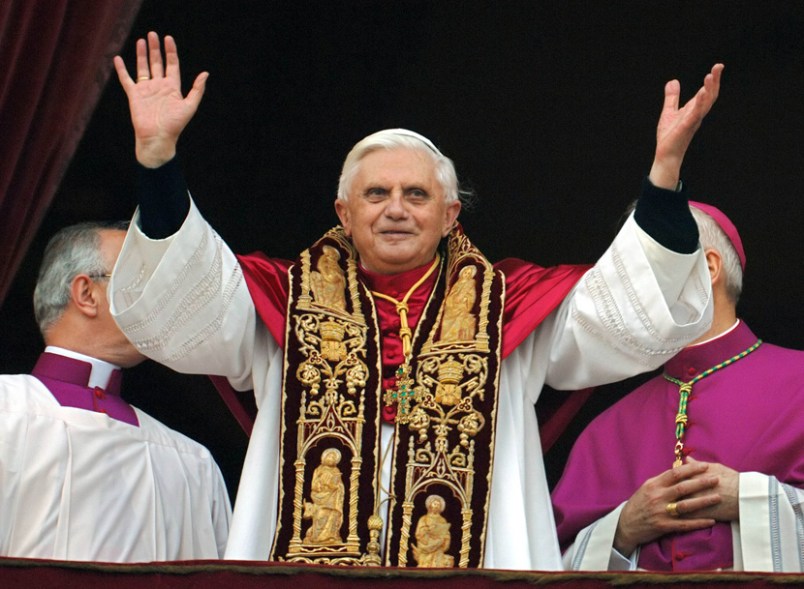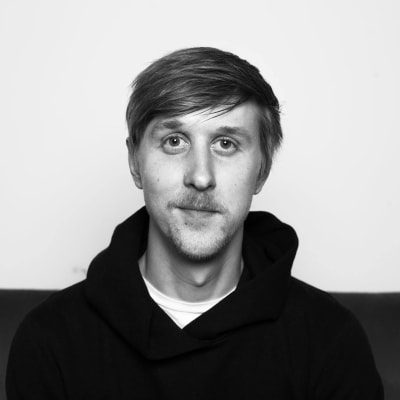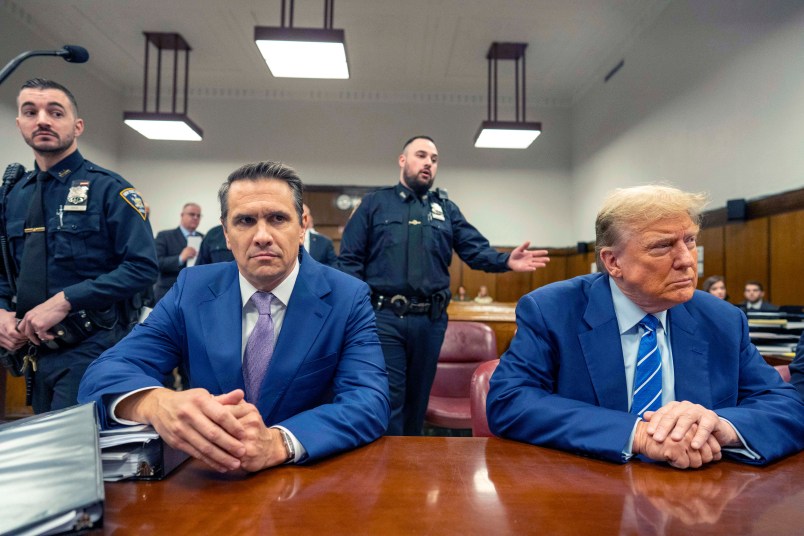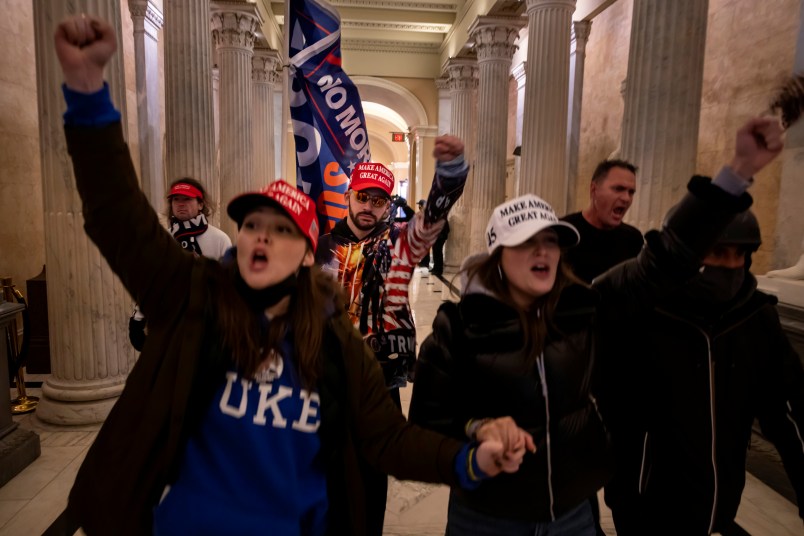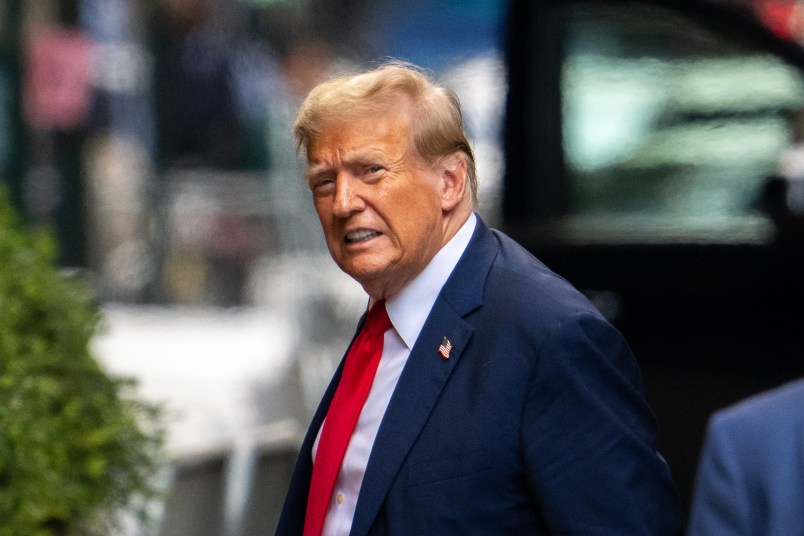Updated: 11:55 a.m. ET, March 10
As the Roman Catholic Church’s cardinals gather to elect a new pope, the Associated Press has published biographies of the men seen as the top contenders to succeed Pope Benedict XVI. Below are links to the published bios. TPM will update this post with new stories as they are available.
Cardinal of the Philippines Luis Antonio Tagle

Luis Antonio Tagle / Image via AP
IMUS, Philippines (AP) — Asia’s most prominent Roman Catholic leader knows how to reach the masses: He sings on stage, preaches on TV, brings churchgoers to laughter and tears with his homilies. And he’s on Facebook.
But Philippine Cardinal Luis Antonio Tagle’s best response against the tide of secularism, clergy sex abuse scandals and rival-faith competition could be his reputation for humility. His compassion for the poor and unassuming ways have impressed followers in his homeland, Asia’s largest Catholic nation, and church leaders in the Vatican.
Tagle’s rising star has opened a previously unimaginable possibility: An Asian pope.
The Filipino prelate’s chances are considered remote, as many believe that Latin America or Africa — with their faster growing Catholic flocks — would be more logical choices if the papal electors look beyond Europe. But even the hint of papal consideration has electrified many in the heavily Catholic Philippines, where past pontiffs had been welcomed by millions with rock-star intensity.
Cardinal of Hungary Peter Erdo

Peter Erdo / Image via AP
BUDAPEST, Hungary (AP) — He’s the son of a deeply religious couple who defied communist repression to practice their faith. And if elected pope, Hungarian Cardinal Peter Erdo would be the second pontiff to come from eastern Europe — following in the footsteps of the late John Paul II, a Pole who left a great legacy helping to topple communism.
A cardinal since 2003, Erdo is known as an erudite scholar with a common touch. An expert on canon law and distinguished university theologian, he has also striven to forge close ties to the parish faithful.
Erdo regularly visits all his parishes, and established a city mission in Budapest to organize debates, concerts and performances designed to attract people back to the church. Hungary is a country where over half the 10 million citizens say they are Catholic, but only a fraction attends Mass.
Cardinal of Ghana Peter Turkson

Peter Turkson / Image via AP
ACCRA, Ghana (AP) — Often cast as the social conscience of the church, Ghana’s Cardinal Peter Turkson is viewed by many as the top African contender for pope.
The 64-year-old head of the Vatican’s peace and justice office was widely credited with helping to avert violence following contested Ghanaian elections. He has aggressively fought African poverty, while disappointing many by hewing to the church’s conservative line on condom use amid Africa’s AIDS epidemic.
Turkson’s reputation as a man of peace took a hit recently when he showed a virulently anti-Islamic video, a move now seen as hurting his papal prospects. Observers say those prospects sank further when he broke a taboo against public jockeying for the papacy — telling The Associated Press the day after Benedict XVI’s resignation announcement that he’s up for the job “if it’s the will of God.”
Archbishop of Sri Lanka Malcolm Ranjith

Malcolm Ranjith / Image via AP
COLOMBO, Sri Lanka (AP) — In one of his first appointments as pope, Benedict XVI picked a Sri Lankan archbishop to return to the Vatican for a top post overseeing the church’s liturgy and rites.
The choice of Malcolm Ranjith in 2005 rewarded a strong voice of tradition — so rigid that some critics regard it even as backward-looking. And it came as the church increasingly grappled with a critical question for the future: How much innovation can be allowed to cater to developing world congregations with fast-growing flocks?
Ranjith faced a clash of priorities — guarding tradition versus pressure to reform. And in the debate he came mostly on the side of doing things the old way. But he was also guided by diplomatic finesse honed as a Vatican envoy nurturing sensitive relations between mostly Muslim Indonesia and the breakaway nation of predominantly Catholic East Timor.
Ranjith, who in 2010 was named Sri Lanka’s second cardinal in history, now is being mentioned among the possible successors to Benedict if the conclave looks beyond Europe to acknowledge the shifting “southern” demographics of the church.
Cardinal of Brazil Odilo Scherer

Odilo Scherer / Image via AP
SAO PAULO (AP) — Cardinal Odilo Scherer is known for prolific tweeting, appearances on Brazil’s most popular late-night talk show and squeezing into the subway for morning commutes — just like most of the 5 million faithful in his diocese.
Scherer is Brazil’s best hope to be the next pope — and one of the top papal contenders from the developing world.
At the relatively young age of 63, he enthusiastically embraces all new methods for reaching believers, while staying true to a conservative line of Roman Catholic doctrine.
Scherer joined Twitter in 2011 and in his second tweet said: “If Jesus preached the gospel today, he would also use print media, radio, TV, the Internet and Twitter. Give Him a chance!”
Archbishop of Milan Angelo Scola

Angelo Scola / Image via AP
VARESE, Italy (AP) — To illustrate that life is a journey, one of the Italian cardinals touted as a favorite to be the next pope doesn’t just turn to the Scriptures — but also to Jack Kerouac and Cormac McCarthy.
Angelo Scola, the archbishop of Milan, is seen as Italy’s best chance at reclaiming the papacy, following back-to-back popes from outside the country that had a lock on the job for centuries.
For one night last month, during the historic week that saw the shock resignation announcement of Pope Benedict XVI, Scola came across as a simple pastor leading a flock of 20-somethings in a discussion about faith. The powerful cardinal displayed not only an ease with youth but also a desire to make himself understood, a vital quality for a church that is bleeding membership. It was a sharp contrast with Benedict, who was almost painfully shy in public.
Canadian Cardinal Marc Ouellet

Marc Ouellet /
Image via AP
TORONTO (AP) — Cardinal Marc Ouellet once said that being pope “would be a nightmare.” He would know, having enjoyed the confidence of two popes as a top-ranked Vatican insider.
His high-profile position as head of the Vatican’s office for bishops, his conservative leanings, his years in Latin America and his work in Rome as president of a key commission for Latin America all make him a favorite to become the first pontiff from the Americas.
But the qualities that make him popular in Latin America — home to the world’s biggest Catholic population — and among the cardinals who elect the pope have contributed to his poor image in his native Quebec, where ironically he was perceived during his tenure as archbishop as an outsider parachuted in from Rome to reorder his liberal province along conservative lines.
Argentine Cardinals Jorge Mario Bergoglio and Leonardo Sandri

Jorge Mario Bergoglio /
Image via AP
BUENOS AIRES, Argentina (AP) — Both are the sons of Italian immigrants. Both are doctrinal conservatives. And both are known for their warm personalities.
But the two Argentine cardinals widely given an outside chance to become pope have had very different careers.
Jorge Mario Bergoglio, who would be the first Jesuit pope if chosen, has spent nearly his entire career at home in Argentina, overseeing churches and shoe-leather priests. Leonardo Sandri, who left for Rome 42 years ago, is a Vatican insider who has run the day-to-day operations of the global church’s vast bureaucracy and roamed the world as a papal diplomat.
Honduran Cardinal Andres Rodriguez Maradiaga

Andres Rodriguez Maradiaga /
Image via AP
TEGUCIGALPA, Honduras (AP) — To many, Honduran Cardinal Andres Rodriguez Maradiaga embodies the activist wing of the Roman Catholic Church as an outspoken campaigner of human rights, a watchdog on climate change and advocate of international debt relief for poor nations.
Others, however, see him as a reactionary in the other direction: Described as sympathetic to a coup in his homeland and stirring accusations of anti-Semitism for remarks that some believe suggested Jewish interests encouraged extra media attention on church sex abuse scandals.
Both images will follow him into the Sistine Chapel conclave along with other cardinals named as possible successors to Pope Benedict XVI.
New York Cardinal Timothy Dolan

Timothy Dolan /
Image via AP
NEW YORK (AP) — Challenging a White House mandate for birth control coverage in health insurance, New York Cardinal Timothy Dolan sounded like a general rallying the troops.
“The only thing we’re certainly not prepared to do is give in,” Dolan said at a national bishops’ meeting last November. “We’re not violating our consciences.”
Weeks earlier, he had appeared in a far less formal setting, at New York’s Fordham University with comedian Stephen Colbert. From the 3,000 cheering audience members, one student considering the priesthood asked whether he should date. Dolan said it could help decide the right path, then quipped, “By the way, let me give you the phone numbers of my nieces.”
Austrian Cardinal Christoph Schoenborn

Christoph Schoenborn /
Image via AP
VIENNA (AP) — Austrian Cardinal Christoph Schoenborn is a soft-spoken conservative who is ready to listen to those espousing reform. That profile that could appeal to fellow cardinals looking to elect a pontiff with widest-possible appeal to the world’s 1 billion Catholics.
His nationality may be his biggest disadvantage: Electors may be reluctant to choose another German speaker as a successor to Benedict XVI.
A man of low tolerance for the child abuse scandals roiling the church, Schoenborn himself was elevated to the its upper echelons of the Catholic hierarchy after his predecessor resigned 18 years ago over accusations that he was a pedophile.
Cardinal Gianfranco Ravasi, head of the Vatican’s culture office

Gianfranco Ravasi /
Image via AP
VATICAN CITY (AP) — He quotes Amy Winehouse and, unlike Benedict XVI, actually taps out his tweets himself. Cardinal Gianfranco Ravasi is an erudite scholar with a modern touch — and that is seen by some as just the combination the Catholic Church needs to revive a church beset by scandal and a shrinking flock.
Benedict’s culture minister at the Vatican, Ravasi consistently makes the short lists of closely watched candidates to be the next pope. He is one of the favorites among Catholics who long to see a return to the tradition of Italian popes. The polyglot biblical scholar peppers speeches with references ranging from Aristotle to late British diva Winehouse.
At Benedict’s request, Ravasi led the pontiff and other Vatican prelates in daily Lenten meditation and prayer services during what turned out to be the pontiff’s last full week in the papacy. Ravasi’s words were podcast for all to hear on Vatican Radio, and the prelate tweeted in English and Italian to give the flavor of his sermons to those outside the Holy See’s inner circle. Ravasi’s foreign language prowess is reminiscent of that of the late globetrotting John Paul II: He tweets in English, chats in Italian and has impressed his audiences by switching to Hebrew and Arabic in some of his speeches. As a child, he taught himself ancient Greek.
Ravasi’s intellect is so hungry that he doesn’t seem to sleep much at night. “He is so busy reading and digesting things,” said John Thavis, author of the recently published “The Vatican Diaries,” an inside look at the workings of the Holy See.





